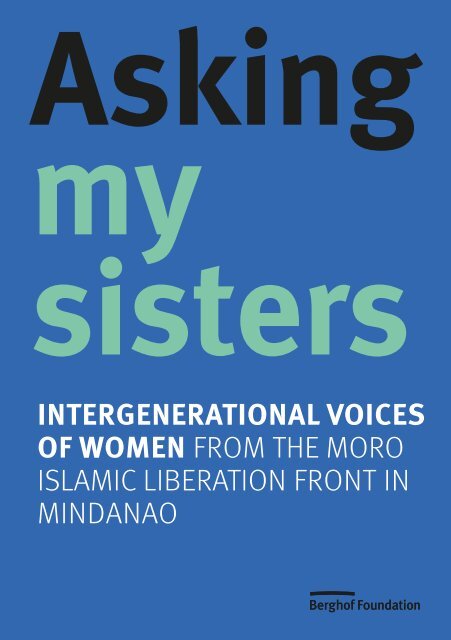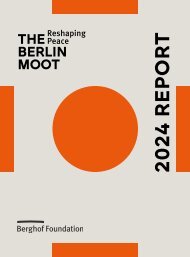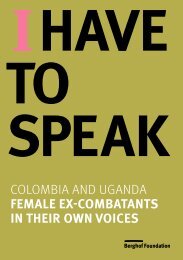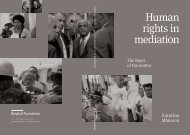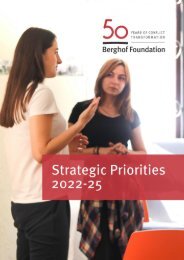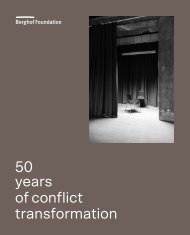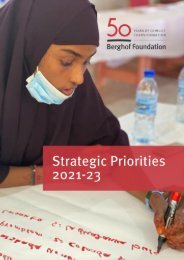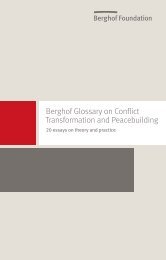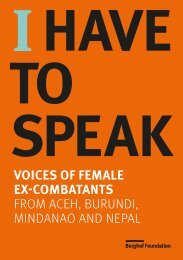Asking my sisters: Intergenerational voices of women from the Moro Islamic Liberation Front in Mindanao
In this booklet female ex-combatants from the Moro Islamic Liberation Front - Bangsamoro Women's Auxiliary Brigade (MILF-BIWAB) and their daughters in Muslim Mindanao share their stories from the region’s post-conflict recovery process.
In this booklet female ex-combatants from the Moro Islamic Liberation Front - Bangsamoro Women's Auxiliary Brigade (MILF-BIWAB) and their daughters in Muslim Mindanao share their stories from the region’s post-conflict recovery process.
You also want an ePaper? Increase the reach of your titles
YUMPU automatically turns print PDFs into web optimized ePapers that Google loves.
<strong>Ask<strong>in</strong>g</strong><br />
<strong>my</strong><br />
<strong>sisters</strong><br />
INTERGENERATIONAL VOICES<br />
OF WOMEN FROM THE MORO<br />
ISLAMIC LIBERATION FRONT IN<br />
MINDANAO
PUBLISHED BY<br />
Bergh<strong>of</strong> Foundation Operations gGmbH<br />
© Bergh<strong>of</strong> Foundation Operations gGmbH<br />
L<strong>in</strong>denstraße 34<br />
10969 Berl<strong>in</strong><br />
Germany<br />
www.bergh<strong>of</strong>-foundation.org<br />
November 2021<br />
All rights reserved.<br />
CITATION<br />
<strong>Ask<strong>in</strong>g</strong> <strong>my</strong> <strong>sisters</strong>. <strong>Intergenerational</strong> <strong>voices</strong> <strong>of</strong> <strong>women</strong> <strong>from</strong> <strong>the</strong> <strong>Moro</strong> <strong>Islamic</strong><br />
<strong>Liberation</strong> <strong>Front</strong> <strong>in</strong> M<strong>in</strong>danao. Edited by Carolien van Ho<strong>of</strong>, St<strong>in</strong>a Lundström and<br />
Véronique Dudouet, with Mohanie U. Kasan, Mariffa M. Samayat<strong>in</strong>, Monawara<br />
Kumayog, Armia U. Ebrahim, Ledrolen R. Manriquez, Jehan A. Usop, and<br />
Ba<strong>in</strong>a T. Samayat<strong>in</strong><br />
Berl<strong>in</strong>: Bergh<strong>of</strong> Foundation. 2021.<br />
Design and layout: AMBERPRESS, Katja Koeberl<strong>in</strong>, Gosia Warr<strong>in</strong>k<br />
Our thanks go to all <strong>the</strong> <strong>women</strong> who shared <strong>the</strong>ir stories; and <strong>in</strong> Berl<strong>in</strong> to<br />
Beatrix Aust<strong>in</strong>, for accompaniment <strong>of</strong> <strong>the</strong> journey and valuable help <strong>in</strong> shap<strong>in</strong>g<br />
this report.<br />
This publication follows <strong>in</strong> <strong>the</strong> footsteps and was <strong>in</strong>spired by I Have to Speak.<br />
Voices <strong>of</strong> Female Ex-Combatants <strong>from</strong> Aceh, Burundi, M<strong>in</strong>danao and Nepal,<br />
published by <strong>the</strong> Bergh<strong>of</strong> Foundation <strong>in</strong> 2020.<br />
I Have To Speak – Bergh<strong>of</strong> Foundation (bergh<strong>of</strong>-foundation.org)<br />
Download I have to speak<br />
Supported and funded by Deutsche Gesellschaft für Internationale Zusammenarbeit<br />
(GIZ) GmbH on behalf <strong>of</strong> <strong>the</strong> German Federal M<strong>in</strong>istry for Economic<br />
Cooperation and Development.<br />
The <strong>in</strong>formation and views set out <strong>in</strong> this publication are those <strong>of</strong> <strong>the</strong> participants<br />
and do not necessarily reflect <strong>the</strong> <strong>of</strong>ficial op<strong>in</strong>ion <strong>of</strong> <strong>the</strong> Bergh<strong>of</strong> Foundation, GIZ,<br />
and <strong>Moro</strong> Women Development and Cultural Center (MWDECC).
<strong>Ask<strong>in</strong>g</strong><br />
<strong>my</strong><br />
<strong>sisters</strong><br />
INTERGENERATIONAL VOICES<br />
OF WOMEN FROM THE MORO<br />
ISLAMIC LIBERATION FRONT<br />
IN MINDANAO
CONTENT<br />
6<br />
8<br />
10<br />
11<br />
45<br />
INTRODUCTORY WORDS BY BERGHOF FOUNDATION<br />
INTRODUCTORY WORDS BY MORO WOMEN<br />
DEVELOPMENT AND CULTURAL CENTER (MWDECC)<br />
CONFLICT TIMELINE<br />
RESEARCHERS & CONTRIBUTORS<br />
KEY ACRONYMS
14<br />
22<br />
28<br />
34<br />
38<br />
“I HEARD THE STORY OF WOMEN”<br />
PATHWAYS INTO THE STRUGGLE<br />
“OUR SLIPPERS ARE ALWAYS PACKED”<br />
LIFE IN CONFLICT<br />
“WE NEED WOMEN TO FULFIL OUR DREAMS”<br />
WOMEN’S SELF-ORGANISING IN CONFLICT<br />
“NO ONE SHALL BE LEFT BEHIND”<br />
ACHIEVEMENTS OF THE PEACE PROCESS<br />
“IF NOT NOW, IN THE NEXT GENERATION”<br />
ASPIRATIONS FOR THE FUTURE AND LESSONS LEARNT
INTRODUCTORY WORDS<br />
BY BERGHOF FOUNDATION<br />
This report seeks to give a voice to several generations<br />
<strong>of</strong> <strong>women</strong> active <strong>in</strong> <strong>the</strong> <strong>Moro</strong> <strong>Islamic</strong> <strong>Liberation</strong> <strong>Front</strong><br />
(MILF) <strong>in</strong> M<strong>in</strong>danao, Philipp<strong>in</strong>es. These powerful<br />
stories <strong>of</strong> pa<strong>in</strong> and suffer<strong>in</strong>g, but also <strong>of</strong> armed<br />
mobilization aga<strong>in</strong>st <strong>in</strong>justice, land grabb<strong>in</strong>g and<br />
oppression, and <strong>in</strong> pursuit <strong>of</strong> religious freedom, selfgovernance,<br />
gender equity, susta<strong>in</strong>able development<br />
and education, show that female combatants have to<br />
be taken seriously for build<strong>in</strong>g susta<strong>in</strong>able peace.<br />
Through participatory research, young MILF female<br />
members designed and conducted video <strong>in</strong>terviews<br />
with <strong>the</strong>ir peers. They collected ten stories <strong>from</strong> war<br />
veterans and <strong>the</strong>ir daughters who reflected on <strong>the</strong>ir<br />
reasons for jo<strong>in</strong><strong>in</strong>g <strong>the</strong> MILF armed struggle, <strong>the</strong>ir time<br />
as <strong>women</strong> <strong>in</strong> war, <strong>the</strong>ir experience <strong>of</strong> gender roles and<br />
dynamics <strong>in</strong> <strong>the</strong> movement, <strong>the</strong>ir lessons learnt <strong>from</strong><br />
<strong>the</strong> ongo<strong>in</strong>g peace implementation process, and <strong>the</strong>ir<br />
aspirations for <strong>the</strong> future <strong>of</strong> <strong>the</strong>ir country and<br />
<strong>the</strong> com<strong>in</strong>g generations.<br />
The stories, as diverse as <strong>the</strong>y are, emphasise <strong>the</strong><br />
need to engage with <strong>the</strong> fate <strong>of</strong> female ex-combatants,<br />
a section <strong>of</strong> post-war societies that is usually<br />
forgotten and under-represented. Dur<strong>in</strong>g <strong>the</strong> MILF<br />
armed struggle for self-determ<strong>in</strong>ation for <strong>the</strong> Muslim<br />
Bangsamoro people <strong>in</strong> <strong>the</strong> Philipp<strong>in</strong>e island <strong>of</strong><br />
M<strong>in</strong>danao, <strong>women</strong> <strong>of</strong> <strong>the</strong> movement self-organised<br />
<strong>in</strong>to several civilian and military entities. One <strong>of</strong> <strong>the</strong>m<br />
was <strong>the</strong> Bangsamoro <strong>Islamic</strong> Women Auxiliary Brigade<br />
(BIWAB), an all-female force that constituted a part<br />
<strong>of</strong> <strong>the</strong> MILF armed forces. BIWAB’s ma<strong>in</strong> mission was<br />
to ensure <strong>the</strong> safety <strong>of</strong> <strong>the</strong> combatants by attend<strong>in</strong>g to<br />
<strong>the</strong>ir medical and o<strong>the</strong>r basic needs, and to serve<br />
as a reserve force.<br />
6 – 7
<strong>in</strong> order to reflect on <strong>the</strong> valuable<br />
contributions made by female<br />
BIWAB commanders <strong>in</strong> <strong>the</strong> last<br />
three decades <strong>of</strong> struggle, as well<br />
as <strong>the</strong> aspirations <strong>of</strong> <strong>the</strong>ir younger<br />
peers to pursue Jihad through peaceful<br />
social and political activism.<br />
In <strong>the</strong> aftermath <strong>of</strong> <strong>the</strong> 2014 peace<br />
accord with <strong>the</strong> Philipp<strong>in</strong>e government,<br />
<strong>the</strong> establishment <strong>of</strong> <strong>the</strong><br />
Bangsamoro Autonomous Region<br />
<strong>in</strong> Muslim M<strong>in</strong>danao (BARMM) <strong>in</strong><br />
2019 fulfilled a central aspiration<br />
<strong>of</strong> <strong>the</strong> MILF to rule over <strong>the</strong>ir own<br />
territory and ancestral doma<strong>in</strong>s.<br />
As a result, <strong>the</strong> MILF <strong>in</strong>itiated <strong>the</strong><br />
decommission<strong>in</strong>g <strong>of</strong> its combatants.<br />
BIWAB <strong>women</strong> seized <strong>the</strong><br />
momentum to transform <strong>the</strong>ir<br />
military structure <strong>in</strong>to a self-led<br />
civilian organisation, <strong>the</strong> League<br />
<strong>of</strong> <strong>Moro</strong> Women Organization<br />
Incorporated (LMWOI).<br />
This report re<strong>in</strong>forces our belief<br />
that a more nuanced picture <strong>of</strong> <strong>the</strong><br />
various ways <strong>in</strong> which <strong>women</strong> jo<strong>in</strong><br />
and participate <strong>in</strong> conflicts is necessary<br />
to prevent war and enable susta<strong>in</strong>able<br />
peace; and that <strong>the</strong> <strong>voices</strong><br />
<strong>of</strong> <strong>the</strong>se young future leaders, <strong>the</strong>ir<br />
concerns and <strong>the</strong>ir hopes for <strong>the</strong><br />
peace process ought to be amplified<br />
to streng<strong>the</strong>n <strong>the</strong>ir capacity for<br />
and role <strong>in</strong> peacebuild<strong>in</strong>g.<br />
The testimonies collected <strong>in</strong> this<br />
publication were produced by our<br />
partner organisation <strong>Moro</strong> Women<br />
Development and Cultural Center<br />
(MWDECC), with fund<strong>in</strong>g <strong>from</strong><br />
<strong>the</strong> German Corporation for<br />
International Cooperation (GIZ).<br />
The report is accompanied by a<br />
video documentary, which was<br />
launched <strong>in</strong> October 2021 through<br />
a dialogue sem<strong>in</strong>ar to elicit a fruitful<br />
<strong>in</strong>ter-generational exchange.<br />
These provided avenues for <strong>the</strong><br />
researchers to present and discuss<br />
<strong>the</strong> results back to <strong>the</strong>ir community,
INTRODUCTORY WORDS<br />
BY MORO WOMEN DEVELOPMENT<br />
AND CULTURAL CENTER (MWDECC)<br />
This report, and <strong>the</strong> accompany<strong>in</strong>g video documentary,<br />
are a product <strong>of</strong> collective efforts <strong>of</strong> MWDECC and<br />
BIWAB to shed light on <strong>the</strong> undocumented participation<br />
and contributions <strong>of</strong> <strong>women</strong> <strong>in</strong> <strong>the</strong> Bangsamoro<br />
struggle. This will enlighten <strong>the</strong> young generation<br />
on <strong>the</strong> roles played by <strong>the</strong> Bangsamoro <strong>women</strong> as<br />
<strong>the</strong>y contributed to <strong>the</strong> atta<strong>in</strong>ment <strong>of</strong> freedom and<br />
susta<strong>in</strong>able peace and development <strong>in</strong> <strong>the</strong> Bangsamoro<br />
homeland.<br />
The recorded and documented narratives are considered<br />
as a historic document which will serve as a vital<br />
reference for <strong>the</strong> next generations who will form part<br />
<strong>of</strong> <strong>the</strong> future Bangsamoro saga. The next generation,<br />
who will value and enjoy <strong>the</strong> fruits <strong>of</strong> <strong>the</strong> sacrifices<br />
<strong>of</strong> BIWAB, may draw lessons <strong>from</strong> <strong>the</strong> great unprecedented<br />
contributions <strong>of</strong> <strong>the</strong> <strong>women</strong> as <strong>the</strong>y stood on<br />
<strong>the</strong> foreground to fight for <strong>the</strong> rights <strong>of</strong> <strong>the</strong>ir nation.<br />
8 – 9
acceptable and trusted by BIWAB,<br />
with strong commitment and<br />
will<strong>in</strong>gness to serve BIWAB and<br />
MWDECC beyond this project.<br />
The realization <strong>of</strong> this project<br />
underwent a thorough process,<br />
<strong>from</strong> <strong>the</strong> selection <strong>of</strong> researchers<br />
to <strong>the</strong> identification <strong>of</strong> <strong>in</strong>terviewees.<br />
The establishment <strong>of</strong><br />
coord<strong>in</strong>ation process and mechanism<br />
anchored on <strong>the</strong> context <strong>of</strong><br />
<strong>the</strong> battle-scarred Bangsamoro<br />
communities which played an<br />
<strong>in</strong>dispensable role <strong>in</strong> <strong>the</strong> success<br />
<strong>of</strong> <strong>the</strong> project’s implementation.<br />
Cont<strong>in</strong>gency plans were set to ensure<br />
that unfavourable situations<br />
and o<strong>the</strong>r <strong>in</strong>terven<strong>in</strong>g events that<br />
would hamper <strong>the</strong> execution <strong>of</strong><br />
<strong>the</strong> project would be pre-empted.<br />
First and foremost, <strong>the</strong> challenges<br />
related to <strong>the</strong> COVID-19 pandemic<br />
were dealt with accord<strong>in</strong>gly.<br />
Experience, geographical location<br />
and tribe were among <strong>the</strong> identified<br />
variables used <strong>in</strong> select<strong>in</strong>g<br />
<strong>the</strong> <strong>in</strong>terviewees who were classified<br />
as old combatants and young<br />
combatants. Both <strong>the</strong> young and<br />
old combatants were <strong>in</strong>terviewed<br />
to ensure that both age groups are<br />
represented <strong>in</strong> <strong>the</strong> documentary.<br />
This report will hopefully help to<br />
enlighten <strong>the</strong> sons and daughters<br />
<strong>of</strong> <strong>the</strong> <strong>women</strong> combatants who<br />
were deprived <strong>of</strong> <strong>the</strong>ir rights to<br />
enjoy a complete and happy family<br />
life while <strong>the</strong>ir mo<strong>the</strong>rs were <strong>in</strong> <strong>the</strong><br />
struggle. Thus, it also serves as<br />
an <strong>in</strong>strument for br<strong>in</strong>g<strong>in</strong>g toge<strong>the</strong>r<br />
<strong>the</strong> families that suffered <strong>the</strong><br />
distastefulness <strong>of</strong> be<strong>in</strong>g disunited<br />
for a long uncerta<strong>in</strong> time.<br />
Criteria were provided <strong>in</strong> <strong>the</strong> selection<br />
<strong>of</strong> researchers consider<strong>in</strong>g<br />
<strong>the</strong> challeng<strong>in</strong>g nature <strong>of</strong> <strong>the</strong> job.<br />
Hence, <strong>the</strong> pool <strong>of</strong> researchers who<br />
conducted <strong>the</strong> <strong>in</strong>terviews were<br />
chosen <strong>from</strong> BIWAB to ensure and<br />
ma<strong>in</strong>ta<strong>in</strong> <strong>the</strong> trust and confidence<br />
<strong>of</strong> <strong>the</strong> <strong>in</strong>terviewees throughout<br />
<strong>the</strong> process. The researchers were<br />
selected based on set criteria such<br />
as educational atta<strong>in</strong>ment.<br />
The researchers needed to be
CONFLICT TIMELINE<br />
10 – 11<br />
1978<br />
1984<br />
January 7,<br />
1997<br />
March 22,<br />
2000<br />
February 11,<br />
2000<br />
October 14,<br />
2008<br />
October 15,<br />
2012<br />
March 27,<br />
2014<br />
July 26,<br />
2018<br />
January 21,<br />
2019 and<br />
February 6,<br />
2019<br />
Found<strong>in</strong>g <strong>of</strong> <strong>the</strong> <strong>Moro</strong> <strong>Islamic</strong> <strong>Liberation</strong> <strong>Front</strong> (MILF)<br />
under <strong>the</strong> leadership <strong>of</strong> Ustadz Salamat Hashim.<br />
Establishment <strong>of</strong> Bangsamoro <strong>Islamic</strong> Women Auxiliary<br />
Brigade (BIWAB).<br />
Formal Peace Talks <strong>in</strong>itiated between <strong>the</strong> Government<br />
<strong>of</strong> <strong>the</strong> Philipp<strong>in</strong>es (GPH) and <strong>the</strong> MILF dur<strong>in</strong>g <strong>the</strong><br />
adm<strong>in</strong>istration <strong>of</strong> President Fidel Ramos<br />
“All-out war” launched by <strong>the</strong> government aga<strong>in</strong>st<br />
<strong>the</strong> MILF under <strong>the</strong> adm<strong>in</strong>istration <strong>of</strong> former President<br />
Joseph Estrada<br />
Ano<strong>the</strong>r “all-out war’ unleashed by former President<br />
Gloria Macapagal-Arroyo aga<strong>in</strong>st <strong>the</strong> MILF<br />
Armed confrontation between <strong>the</strong> forces <strong>of</strong> GPH and<br />
MILF erupted when <strong>the</strong> Philipp<strong>in</strong>e Supreme Court<br />
issued a Temporary Restra<strong>in</strong><strong>in</strong>g Order (TRO) to <strong>the</strong><br />
<strong>in</strong>itially signed Memorandum <strong>of</strong> Agreement on<br />
Ancestral Doma<strong>in</strong> (MoA-AD)<br />
Sign<strong>in</strong>g <strong>of</strong> Framework Agreement on <strong>the</strong> Bangsamoro<br />
(FAB) <strong>in</strong> Manila, Philipp<strong>in</strong>es under <strong>the</strong> adm<strong>in</strong>istration<br />
<strong>of</strong> former President Benigno Semion Aqu<strong>in</strong>o III.<br />
Signature <strong>of</strong> <strong>the</strong> f<strong>in</strong>al peace agreement, <strong>the</strong><br />
Comprehensive Agreement on Bangsamoro (CAB),<br />
between <strong>the</strong> GPH and <strong>the</strong> MILF <strong>in</strong> Manila.<br />
President Rodrigo R. Duterte signed <strong>the</strong> landmark<br />
Bangsamoro Organic Law (BOL) that replaces <strong>the</strong> Autonomous<br />
Region <strong>in</strong> Muslim M<strong>in</strong>danao (ARMM).<br />
Ratification <strong>of</strong> Republic Act (RA) No. 11054 or <strong>the</strong> Bangsamoro<br />
Organic Law (BOL) through plebiscites and <strong>the</strong><br />
establishment <strong>of</strong> <strong>the</strong> Bangsamoro Autonomous Region<br />
<strong>in</strong> Muslim M<strong>in</strong>danao (BARMM).
RESEARCHERS<br />
MS. MOHANIE KASAN<br />
MS. MARIFFA SAMAYATIN<br />
MS. MONAWARA KUMAYOG
CONTRIBUTORS<br />
FEMALE EX-COMBATANTS FROM THE<br />
BANG-SAMORO ISLAMIC WOMEN AUXILIARY<br />
BRIGADE (BIWAB)<br />
MS. ANISA “LING” GUMANDER, age 68,<br />
BIWAB Brigade Commander, served for 49 years.<br />
MS. (MALIYA D.) WILMA MADATO, age 54,<br />
BIWAB Tra<strong>in</strong><strong>in</strong>g and Education Department,<br />
served for 44 years.<br />
MS. ALYAH E. SALIK, age 44,<br />
BIWAB Battalion Commander, served for 26 years.<br />
MS. PAHMIA SEBING-HAMID, age 49,<br />
BIWAB Battalion Commander, served for 26 years.<br />
MS. UMMO WEEDAD MIMBANTAS, age 60,<br />
BIWAB Battalion Mursidat, served for 22 years<br />
MS. ROQAYYA CAMALUDIN BILAY, age 50,<br />
BIWAB Battalion Commander, served for 26 years.<br />
MS. HASNAH MACMOD ABDOLLAH, age 42,<br />
BIWAB Battalion Commander, served for 26 years.<br />
12 – 13
WOMEN FROM THE YOUNG GENERATION OF<br />
BIWAB COMBATANTS AND MEMBERS<br />
MS. JOHANI DIMALAO IBAD, age 25,<br />
BIWAB Battalion Commander, served for 10 years.<br />
Her fa<strong>the</strong>r, Zuharto Ibad, is a Brigade Commander<br />
<strong>of</strong> <strong>the</strong> BIAF, and part <strong>of</strong> <strong>the</strong> National Guard.<br />
MS. NORJANE HUSSEIN ANDONG, age 39,<br />
BIWAB Executive Secretary. Her fa<strong>the</strong>r, Hon. Husse<strong>in</strong><br />
P Munoz is <strong>the</strong> Deputy Chief <strong>of</strong> Staff <strong>of</strong> <strong>the</strong> MILF and<br />
a member <strong>of</strong> <strong>the</strong> BARMM Parliament for <strong>the</strong> MILF.<br />
MS. SOPHIE Y. SAMION, age 31 and<br />
MS. SHATRA Y. SAMION, age 27,<br />
members <strong>of</strong> BIWAB. Their Fa<strong>the</strong>r, Murphy L. Samion<br />
is a member <strong>of</strong> BIAF.<br />
MS. RAJMA EBRAHIM, age 29,<br />
<strong>in</strong>structor and chairwoman <strong>of</strong> <strong>the</strong> Lumpukan na<br />
Kababayan Consumer Cooperative. Her mo<strong>the</strong>r, Maria<br />
Amor Ebrahim, is Social Welfare Committee (SWC)<br />
Prov<strong>in</strong>cial Chairwoman, and her fa<strong>the</strong>r, Sahar Ibrahim,<br />
is a member <strong>of</strong> <strong>the</strong> BIAF.
PATHWAYS INTO THE STRUGGLE<br />
14 – 15<br />
MS. PAHMIA SEBING-HAMID | AGE 49
“I HEARD THE STORY<br />
OF WOMEN”<br />
Violence, oppression, <strong>in</strong>equality and<br />
deprivation force people and communities<br />
to make difficult decisions <strong>in</strong> wartime,<br />
triggered by dramatic personal<br />
and collective experiences. What factors<br />
drive <strong>women</strong> to jo<strong>in</strong> <strong>the</strong> call to arms,<br />
be it as a combatant, a tra<strong>in</strong>er, a nurse,<br />
a cook, or a social activist? The various<br />
responses to this question reveal<br />
<strong>in</strong>terest<strong>in</strong>g <strong>in</strong>tergenerational patterns.<br />
Senior <strong>women</strong> veterans serv<strong>in</strong>g as<br />
BIWAB commanders or tra<strong>in</strong>ers shared<br />
<strong>the</strong>ir pa<strong>in</strong>ful memories <strong>of</strong> collective<br />
discrim<strong>in</strong>ation and repression, as well<br />
as <strong>the</strong>ir direct experiences <strong>of</strong> violence,<br />
torture and kill<strong>in</strong>gs <strong>of</strong> close family<br />
members. Their peers <strong>from</strong> <strong>the</strong> younger<br />
generation were more likely to jo<strong>in</strong> <strong>the</strong><br />
struggle due to family ties <strong>in</strong> <strong>the</strong> movement,<br />
a sense <strong>of</strong> duty or commitment,<br />
and <strong>the</strong> desire to promote Jihad.
PATHWAYS INTO THE STRUGGLE<br />
COLLECTIVE DISCRIMINATION<br />
AND OPPRESSION<br />
Pahmia Seb<strong>in</strong>g-Hamid<br />
We had to jo<strong>in</strong> <strong>the</strong> struggle because <strong>of</strong> <strong>the</strong> oppression<br />
and discrim<strong>in</strong>ation.<br />
Anisa “L<strong>in</strong>g” Gumander<br />
I jo<strong>in</strong>ed because we saw what was happen<strong>in</strong>g, our<br />
relatives were gradually annihilated, especially<br />
our relatives <strong>in</strong> Islam <strong>in</strong> <strong>the</strong> North (upstream).<br />
In 1972, <strong>the</strong> Bangsamoro were deliberately opposed<br />
without do<strong>in</strong>g anyth<strong>in</strong>g, and because <strong>of</strong> that our<br />
Muslim bro<strong>the</strong>rs and <strong>sisters</strong> had <strong>the</strong> consciousness<br />
to fight because we did not want <strong>the</strong>m to just kill us<br />
for no reason.<br />
Roqqaya Calamud<strong>in</strong> Bilay<br />
It hurt me see<strong>in</strong>g <strong>my</strong> Muslim bro<strong>the</strong>rs and <strong>sisters</strong><br />
abused, deprived <strong>of</strong> <strong>the</strong>ir houses, and <strong>the</strong>ir animals<br />
and livestock be<strong>in</strong>g taken <strong>from</strong> <strong>the</strong>m. I witnessed<br />
<strong>the</strong> abuses done to <strong>my</strong> bro<strong>the</strong>rs <strong>in</strong> Islam. This pushed<br />
me to jo<strong>in</strong> <strong>the</strong> struggle.<br />
Hasnah Macmod Abdollah<br />
As well as <strong>in</strong> our m<strong>in</strong>ds, it is ultimately <strong>in</strong> our hearts<br />
that we will fight because <strong>of</strong> what our ancestors went<br />
through here.<br />
Norjane Husse<strong>in</strong> Andong<br />
There were times that if you wore a hijab, you would<br />
be followed and <strong>in</strong>vestigated even <strong>in</strong> malls. But deep<br />
<strong>in</strong>side I was really scared because I didn’t know what<br />
<strong>the</strong>y were th<strong>in</strong>k<strong>in</strong>g. They were maybe th<strong>in</strong>k<strong>in</strong>g that<br />
I’m a terrorist or maybe <strong>the</strong>y thought I’m a MILF rebel<br />
because we were not free back <strong>the</strong>n.<br />
16 – 17
MS. HASNAH MACMOD ABDOLLAH | AGE 42<br />
Anisa “L<strong>in</strong>g” Gumander<br />
We were also afraid, everyone was afraid, but we<br />
endured it because we did not want to be oppressed<br />
and we saw that our bro<strong>the</strong>rs were fight<strong>in</strong>g.<br />
Rajma T. Ebrahim<br />
I knew what we are fight<strong>in</strong>g for <strong>in</strong> BIWAB. I knew that<br />
I’m fight<strong>in</strong>g for <strong>my</strong> freedom to exercise <strong>my</strong> religion.<br />
Pahmia Seb<strong>in</strong>g-Hamid<br />
We were robbed <strong>of</strong> our land, and we were expelled<br />
<strong>from</strong> our own land. So, it is our obligation to jo<strong>in</strong><br />
Jihad.<br />
Hasnah Macmod Abdollah<br />
Especially when histories <strong>of</strong> massacres were told<br />
by our parents, I realised that <strong>women</strong> and children<br />
must participate <strong>in</strong> Jihad, not only through <strong>the</strong> use <strong>of</strong><br />
firearms, but <strong>the</strong>y can help <strong>in</strong> many ways, like giv<strong>in</strong>g<br />
support through words and do<strong>in</strong>g good deeds.
PATHWAYS INTO THE STRUGGLE<br />
18 – 19<br />
Roqqaya Calamud<strong>in</strong> Bilay<br />
I jo<strong>in</strong>ed BIWAB because <strong>of</strong> <strong>the</strong> hardships I experienced<br />
toge<strong>the</strong>r with <strong>my</strong> parents. Our situation is very critical<br />
and it’s very hard if no one will stand and fight for our<br />
rights as a Muslim, especially here <strong>in</strong> Salama, where<br />
Muslim are <strong>the</strong> m<strong>in</strong>ority.<br />
GENDERED VIOLENCE<br />
Alyah E. Salik<br />
When I heard <strong>the</strong> story <strong>of</strong> <strong>women</strong> who were helplessly<br />
raped by soldiers and be<strong>in</strong>g killed, I told <strong>my</strong>self that<br />
Insha’Allah, when I grew up, if <strong>the</strong>re was a group who<br />
were will<strong>in</strong>g to tra<strong>in</strong> military, I would not hesitate to<br />
jo<strong>in</strong> so that I wouldn’t experience what our Bangsamoro<br />
<strong>sisters</strong> experienced dur<strong>in</strong>g Martial Law. So that's<br />
one <strong>of</strong> <strong>the</strong> reasons that pushed me to jo<strong>in</strong>.<br />
Anisa “L<strong>in</strong>g” Gumander<br />
What I will never forget until now is when <strong>my</strong> first<br />
cous<strong>in</strong> was taken by <strong>the</strong> soldiers <strong>in</strong> 1978. Her name<br />
was Camilla Gumander, she is like a sister to me.<br />
The soldiers raped her. She was also deta<strong>in</strong>ed <strong>in</strong> <strong>the</strong><br />
soldiers’ camp for a few months. She only escaped<br />
with <strong>the</strong> help <strong>of</strong> a soldier who became her friend <strong>the</strong>re.<br />
But when she came home, her whole body was full <strong>of</strong><br />
dark spots caused by cigarette burns perpetrated by<br />
<strong>the</strong> soldiers, which was done to her after <strong>the</strong>y raped<br />
her. My o<strong>the</strong>r cous<strong>in</strong> was also taken by <strong>the</strong> soldiers,<br />
who beheaded her and put her head <strong>in</strong> a hat. All we<br />
got was her body and we buried her headless.<br />
Hasnah Macmod Abdollah<br />
My female cous<strong>in</strong>s were taken and put on a naval<br />
boat. They were exposed to <strong>the</strong> sun for two days.<br />
And when <strong>the</strong>y died, <strong>the</strong>y were thrown <strong>in</strong>to <strong>the</strong> sea.<br />
The children who died were not even buried and were<br />
also thrown <strong>in</strong>to <strong>the</strong> sea, not even mov<strong>in</strong>g near <strong>the</strong><br />
shore.
Maliya Madato<br />
I told <strong>my</strong>self that I would jo<strong>in</strong> <strong>the</strong> BIAF so that I would<br />
not be like those <strong>women</strong> who were violated, raped,<br />
and thrown by <strong>the</strong> military.<br />
Pahmia Seb<strong>in</strong>g-Hamid<br />
Dur<strong>in</strong>g martial law, <strong>women</strong> were <strong>the</strong> most vulnerable<br />
aga<strong>in</strong>st violations.<br />
FAMILY TIES AND INTERGENERATIONAL<br />
EXPERIENCES<br />
Maliya Madato<br />
I jo<strong>in</strong>ed <strong>the</strong> tra<strong>in</strong><strong>in</strong>g to protect <strong>my</strong>self and <strong>my</strong> family.<br />
Pahmia Seb<strong>in</strong>g-Hamid<br />
It’s difficult for me because I jo<strong>in</strong>ed <strong>the</strong> war <strong>in</strong> <strong>the</strong><br />
mounta<strong>in</strong>s leav<strong>in</strong>g <strong>my</strong> family with noth<strong>in</strong>g, not even<br />
a s<strong>in</strong>gle cent. When you left <strong>the</strong>m, you were not sure<br />
if you could still return alive. But we couldn’t do<br />
anyth<strong>in</strong>g else than Jihad for <strong>the</strong>ir future.<br />
Johani Ibad<br />
I jo<strong>in</strong>ed BIWAB because <strong>my</strong> fa<strong>the</strong>r <strong>in</strong>spired me.<br />
My fa<strong>the</strong>r is a member <strong>of</strong> MILF-BIAF and I witnessed<br />
his determ<strong>in</strong>ation <strong>in</strong> carry<strong>in</strong>g out his duties and<br />
responsibilities as a commander. My fa<strong>the</strong>r was<br />
always gone as I grew up. He was always <strong>in</strong> <strong>the</strong> military<br />
camp. I told <strong>my</strong>self that if <strong>women</strong> were allowed <strong>in</strong><br />
BIAF I would really jo<strong>in</strong>.<br />
Norjane Husse<strong>in</strong> Andong<br />
One th<strong>in</strong>g I learned dur<strong>in</strong>g <strong>my</strong> tra<strong>in</strong><strong>in</strong>g <strong>in</strong> BIWAB was<br />
that if we want to have exactly <strong>the</strong> same rewards as<br />
our parents, we also have to go through whatever <strong>the</strong>y<br />
went through.
PATHWAYS INTO THE STRUGGLE<br />
Rajma T. Ebrahim<br />
My mo<strong>the</strong>r was cry<strong>in</strong>g because I was still young and<br />
she knew that BIWAB could go to war. It's a good th<strong>in</strong>g<br />
that <strong>my</strong> leader is also <strong>my</strong> aunt so we trusted her. My<br />
cous<strong>in</strong>s and <strong>my</strong> relatives were also members <strong>of</strong> BIAF<br />
and BIWAB. Almost all <strong>of</strong> us here were members <strong>of</strong><br />
BIAF, <strong>the</strong> Social Welfare Committee (SWC) and BIWAB.<br />
Norjane Husse<strong>in</strong> Andong<br />
My cous<strong>in</strong>s, <strong>my</strong> relatives are members <strong>of</strong> BIAF and<br />
BIWAB. Almost all <strong>of</strong> us here are actually part <strong>of</strong> <strong>the</strong><br />
BIAF, SWC, BIWAB organisations. I was well-<strong>in</strong>formed<br />
because <strong>my</strong> fa<strong>the</strong>r was Brigade Commander here <strong>in</strong><br />
Davao at <strong>the</strong> time.<br />
Hasnah Macmod Abdollah<br />
I jo<strong>in</strong>ed Jihad for <strong>the</strong> future generation. Even if<br />
we cannot harvest <strong>the</strong> fruit <strong>of</strong> this struggle, at least,<br />
our children and <strong>the</strong> next generation cannot experience<br />
those <strong>in</strong>justices done to our parents and to us, and<br />
<strong>the</strong>y can benefit <strong>from</strong> <strong>the</strong> fruit <strong>of</strong> our sacrifices<br />
and hardship.<br />
Anisa “L<strong>in</strong>g” Gumander<br />
Whatever happens I will cont<strong>in</strong>ue and will never<br />
forget <strong>the</strong> <strong>in</strong>justices <strong>my</strong> family experienced.<br />
20 – 21
MS. UMMO WEEDAD MIMBANTAS | AGE 60<br />
RELIGIOUS APPEAL<br />
Sophie Y. Sa<strong>my</strong>ion<br />
My reason for jo<strong>in</strong><strong>in</strong>g is Jihad Ma’am. Only Jihad.<br />
Shatra Y. Samion<br />
I jo<strong>in</strong>ed to streng<strong>the</strong>n <strong>my</strong> belief <strong>in</strong> Islam. Even if I am<br />
just a woman, I really support BIWAB. Because BIWAB<br />
is work<strong>in</strong>g toge<strong>the</strong>r with BIAF, so I just really want to<br />
do Jihad, fight<strong>in</strong>g for <strong>the</strong> sake <strong>of</strong> Allah.<br />
Norjane Husse<strong>in</strong> Andong<br />
My fa<strong>the</strong>r used to hold a program related to Jihad.<br />
So, we were taught that we had an obligation to<br />
support and cont<strong>in</strong>ue what our parents have started<br />
aside <strong>from</strong> our obligation <strong>in</strong> Islam.
LIFE IN CONFLICT<br />
22 – 23<br />
MS. RAJMA T. EBRAHIM | AGE 29
“OUR SLIPPERS WERE<br />
ALWAYS PACKED”<br />
Life dur<strong>in</strong>g conflict is a life <strong>in</strong> constant<br />
fear and comes with both personal and<br />
collective sacrifices. Personal, family<br />
and community suffer<strong>in</strong>gs become a<br />
terrify<strong>in</strong>g part <strong>of</strong> everyday life, leav<strong>in</strong>g<br />
people with difficult decisions to<br />
make and pa<strong>in</strong>ful memories to curate.<br />
How does one raise children dur<strong>in</strong>g<br />
<strong>the</strong> midst <strong>of</strong> war? How do you endure<br />
hunger when bullets are be<strong>in</strong>g fired?<br />
And how can religion be practiced<br />
when your religion makes you a target?<br />
Dur<strong>in</strong>g <strong>the</strong> height <strong>of</strong> <strong>the</strong> conflict,<br />
<strong>the</strong> obligations and duties as <strong>women</strong>,<br />
mo<strong>the</strong>rs, and MILF members had to<br />
be fulfilled at <strong>the</strong> same time.
LIFE IN CONFLICT<br />
HARDSHIPS IN WAR<br />
Anisa “L<strong>in</strong>g” Gumander<br />
In March 9, 1973, <strong>the</strong> <strong>of</strong>fensive began here <strong>in</strong> Sultan<br />
Kudarat. All <strong>the</strong> civilians fled. Then, for more than<br />
ten days we stayed <strong>in</strong> an evacuation area. The civilians<br />
had to move aga<strong>in</strong> because <strong>the</strong>re was ano<strong>the</strong>r shoot<strong>in</strong>g,<br />
and <strong>the</strong>y couldn’t stand <strong>the</strong> hunger. We experienced<br />
hardships, however Alhamdulillah [praise Allah]<br />
no one died, probably because <strong>of</strong> <strong>the</strong> devotion <strong>of</strong> <strong>the</strong><br />
people.<br />
Roqqaya Calamud<strong>in</strong> Bilay<br />
Bomb here, bomb <strong>the</strong>re, our slippers were always<br />
packed <strong>in</strong> a bag because Fa<strong>the</strong>r’s bro<strong>the</strong>r said “Don’t<br />
leave your belong<strong>in</strong>gs beh<strong>in</strong>d, maybe we'll evacuate<br />
later”. What I can’t forget till I die is when we didn’t<br />
have food to eat. We couldn’t get any supply <strong>of</strong> food,<br />
so we just ate dried shrimp mixed with banana pulp<br />
to survive. There were times when we ate only g<strong>in</strong>ger<br />
dur<strong>in</strong>g shuhor [breakfast at dawn dur<strong>in</strong>g <strong>the</strong> month<br />
<strong>of</strong> Ramadhan]. Of course, we cont<strong>in</strong>ued our fast<strong>in</strong>g<br />
because it is part <strong>of</strong> our faith, Islam. As a niqabi,<br />
it was very difficult s<strong>in</strong>ce we had to remove it when<br />
go<strong>in</strong>g to <strong>the</strong> tra<strong>in</strong><strong>in</strong>g camp so as not to look suspicious<br />
to <strong>the</strong> military.<br />
Pahmia Seb<strong>in</strong>g-Hamid<br />
If you ask me how hard it is for mujahid<strong>in</strong> to raise<br />
children, it’s very hard. You have to leave <strong>the</strong>m with<br />
noth<strong>in</strong>g because you have duties and responsibilities<br />
to fulfil.<br />
GENDER ROLES<br />
24 – 25<br />
Anisa “L<strong>in</strong>g” Gumander<br />
At that time, I had not fought <strong>in</strong> combat because<br />
<strong>the</strong>re were still men who could fight and if <strong>the</strong>re were<br />
men, <strong>the</strong> <strong>women</strong> would not fight. The men were<br />
combatants, and <strong>the</strong> <strong>women</strong> were non-combatants.
If we talk about support, we brought <strong>the</strong>m food <strong>in</strong><br />
<strong>the</strong> jungle dur<strong>in</strong>g <strong>the</strong> war. Also, we gave <strong>the</strong>m mats,<br />
clo<strong>the</strong>s and o<strong>the</strong>r necessities that we could provide.<br />
Those were some <strong>of</strong> BIWAB’s responsibilities.<br />
Ummo Weedad Mimbantas<br />
As <strong>women</strong>, we were <strong>the</strong> ones who had easy access<br />
and could easily pass through checkpo<strong>in</strong>ts. There were<br />
so many checkpo<strong>in</strong>ts dur<strong>in</strong>g that time. That’s why we<br />
play a great role <strong>the</strong>n.<br />
Rajma T. Ebrahim<br />
BIWAB is like BIAF but <strong>the</strong>y are just beh<strong>in</strong>d BIAF and<br />
support <strong>the</strong>m. We supplied food and o<strong>the</strong>r BIAF’s<br />
needs dur<strong>in</strong>g <strong>the</strong> guerrilla war.<br />
Roqqaya Calamud<strong>in</strong> Bilay<br />
We really wanted to perform our duty even if it’s just<br />
carry<strong>in</strong>g bullets and food supplies for our Mujahid<strong>in</strong>,<br />
Insha’Allah we did it.<br />
Anisa “L<strong>in</strong>g” Gumander<br />
Everyth<strong>in</strong>g that has to be done <strong>in</strong> this world, it cannot<br />
be done only by men, <strong>the</strong>re should be <strong>women</strong> too.<br />
At <strong>the</strong> height <strong>of</strong> <strong>the</strong> war, <strong>the</strong>re were wounded and<br />
dead combatants. I was ignorant <strong>in</strong> <strong>the</strong> field <strong>of</strong><br />
medic<strong>in</strong>e, but I had to perform dozens <strong>of</strong> surgeries<br />
due to bullet wounds. I used <strong>the</strong> tra<strong>in</strong>ees’ notebooks<br />
as reference because <strong>the</strong>re were no medics and<br />
doctors back <strong>the</strong>n who were members <strong>of</strong> <strong>the</strong> struggle.<br />
Ummo Weedad Mimbantas<br />
The form <strong>of</strong> war at that time was guerrilla warfare.<br />
We were taught how to <strong>in</strong>ject medic<strong>in</strong>e and give<br />
dextrose because <strong>the</strong>re were no active doctors.<br />
Women were tra<strong>in</strong>ed outside and would copy what<br />
<strong>the</strong>y learned <strong>in</strong> treat<strong>in</strong>g <strong>the</strong> wounded.
LIFE IN CONFLICT<br />
Roqqaya Calamud<strong>in</strong> Bilay<br />
When [former Filip<strong>in</strong>o President] Erap Estrada<br />
declared an all-out war, we removed our niqab here<br />
<strong>in</strong> Davao Oriental, it was difficult to deliver medic<strong>in</strong>es<br />
that were needed by our wounded BIAF bro<strong>the</strong>rs.<br />
What we did was to wrap <strong>the</strong> dextrose, bandage<br />
and o<strong>the</strong>r medic<strong>in</strong>es <strong>in</strong> a gift box and ride a motorcycle<br />
wear<strong>in</strong>g a casual dress pretend<strong>in</strong>g to attend a wedd<strong>in</strong>g.<br />
Norjane Husse<strong>in</strong> Andong<br />
So Alhamdulillah [praise Allah], <strong>the</strong>re were <strong>in</strong>stances<br />
we were able to help, for example by collect<strong>in</strong>g<br />
medic<strong>in</strong>es and o<strong>the</strong>r support <strong>from</strong> our relatives when<br />
<strong>the</strong>re were armed clashes. S<strong>in</strong>ce we were so young<br />
back <strong>the</strong>n, we were not f<strong>in</strong>ancially capable and our<br />
resources were very limited.<br />
Alyah E. Salik<br />
What I really wanted was to jo<strong>in</strong> <strong>the</strong> military. I jo<strong>in</strong>ed<br />
as a medical aide until 1994 and jo<strong>in</strong>ed <strong>in</strong> <strong>the</strong> military<br />
tra<strong>in</strong><strong>in</strong>g <strong>of</strong> BIWAB. In 1994, we took basic tra<strong>in</strong><strong>in</strong>g at<br />
Camp Abubakar.<br />
EDUCATION ACROSS GENERATIONS<br />
Johani Ibad<br />
As his children, we never felt sullen or angry, <strong>in</strong>stead<br />
we are proud <strong>of</strong> our fa<strong>the</strong>r. His dedication to his duty<br />
<strong>in</strong> jihad and strong resolve to his pr<strong>in</strong>ciples made us<br />
proud <strong>of</strong> him. Even though he didn’t have enough time<br />
for us, he always rem<strong>in</strong>ded us to study hard. He always<br />
emphasised that our education is <strong>the</strong> only th<strong>in</strong>g he<br />
could leave us.<br />
26 – 27<br />
Our tra<strong>in</strong><strong>in</strong>g was not that difficult compared to <strong>the</strong><br />
previous members. Their tra<strong>in</strong><strong>in</strong>g was held secretly.<br />
My tra<strong>in</strong><strong>in</strong>g was just a basic military tra<strong>in</strong><strong>in</strong>g course<br />
but we also experienced sleep<strong>in</strong>g <strong>in</strong> banana leaves<br />
and just eat<strong>in</strong>g swamp cabbage and salt.
Anisa “L<strong>in</strong>g” Gumander<br />
We will do our best <strong>in</strong> BIWAB to follow whatever order<br />
that was agreed for <strong>the</strong> good <strong>of</strong> Bangsamoro. I’m already<br />
a senior citizen but I’m still here <strong>in</strong> BIWAB serv<strong>in</strong>g<br />
<strong>the</strong> Bangsamoro. I even sacrificed <strong>my</strong> education.<br />
I couldn’t f<strong>in</strong>ish study<strong>in</strong>g both English and Arabic<br />
because I focused on BIWAB.<br />
Norjane Husse<strong>in</strong> Andong<br />
They thought that if you are a rebel, you don’t have<br />
<strong>the</strong> ability to send your children to school but,<br />
Alhamdulillah [praise Allah], we have a management<br />
graduate and <strong>the</strong> third one graduated at Jamiat<br />
Cotabato University and our youngest sister is a human<br />
resource graduate.<br />
Alyah E. Salik<br />
I f<strong>in</strong>ished <strong>my</strong> High School without enter<strong>in</strong>g <strong>the</strong> last<br />
grad<strong>in</strong>g period because I was <strong>in</strong> tra<strong>in</strong><strong>in</strong>g <strong>in</strong> Bombaran<br />
for more than two months.<br />
Pahmia Seb<strong>in</strong>g-Hamid<br />
I was <strong>in</strong> <strong>my</strong> second year <strong>in</strong> college when I jo<strong>in</strong>ed <strong>the</strong><br />
Jihad. I made sure I did <strong>my</strong> responsibility <strong>in</strong> Jihad<br />
despite <strong>the</strong> difficulties. I did <strong>my</strong> best to deliver what<br />
was expected <strong>of</strong> me for <strong>the</strong> future.<br />
Norjane Husse<strong>in</strong> Andong<br />
We should listen to <strong>the</strong> story <strong>of</strong> our parents and<br />
uncles, so that we could appreciate our own history<br />
and this history will be <strong>in</strong>stilled <strong>in</strong> our m<strong>in</strong>ds and<br />
hearts. Let’s make <strong>the</strong> next generation proud <strong>of</strong> us.
WOMEN’S SELF-ORGANISING<br />
IN CONFLICT<br />
28 – 29<br />
MS. ALYAH E. SALIK | AGE 44
“WE NEED WOMEN TO<br />
FULFIL OUR DREAMS”<br />
Armed conflict shapes and re-negotiates<br />
gendered roles, and self-organis<strong>in</strong>g<br />
helps to provide a sense <strong>of</strong> purpose.<br />
BIWAB tells <strong>the</strong> story <strong>of</strong> <strong>women</strong>’s<br />
collective mobilisation. They carved<br />
a space for <strong>the</strong>mselves <strong>in</strong> <strong>the</strong> national<br />
liberation struggle <strong>of</strong> <strong>the</strong> Bangsamoro<br />
people, by serv<strong>in</strong>g <strong>the</strong>ir community.
WOMEN’S SELF-ORGANISING<br />
IN CONFLICT<br />
Ummo Weedad Mimbantas<br />
BIWAB was founded <strong>in</strong> 1991, it was <strong>the</strong>n called<br />
The Bangsa Bae. They helped <strong>the</strong> rebels. When <strong>the</strong>y<br />
needed medic<strong>in</strong>es <strong>the</strong> <strong>women</strong> gave <strong>the</strong>m. The <strong>women</strong><br />
would br<strong>in</strong>g what <strong>the</strong>y needed <strong>in</strong> <strong>the</strong> forest. BIWAB<br />
are <strong>the</strong> <strong>women</strong> who are part <strong>of</strong> governance <strong>in</strong> our<br />
communities. Our goal is to show that we need <strong>women</strong><br />
to fulfil our dreams for good governance <strong>in</strong> our area.<br />
It is difficult to achieve our dreams if men and <strong>women</strong><br />
do not work toge<strong>the</strong>r.<br />
Maliya Madato<br />
Our first objective is to Islamise <strong>the</strong> Bangsamoro<br />
<strong>women</strong> on <strong>the</strong> ground. Our second objective is to<br />
streng<strong>the</strong>n and empower <strong>women</strong> combatants.<br />
The third one is what we call <strong>in</strong>terest, which means<br />
that we want our members to be <strong>in</strong>terested and<br />
dedicated to <strong>the</strong>ir duties and responsibilities.<br />
We never recruited <strong>women</strong> to jo<strong>in</strong> <strong>the</strong> tra<strong>in</strong><strong>in</strong>g,<br />
<strong>the</strong>y personally approached us and tended <strong>the</strong>ir<br />
application. It means <strong>the</strong>re was no coercion, it was<br />
purely voluntary.<br />
Roqqaya Calamud<strong>in</strong> Bilay<br />
If you’re already part <strong>of</strong> BIWAB you have to undergo<br />
an Islamisation program and lectures about Jihad.<br />
Sophie Y. Samion<br />
Military and Exercise were also <strong>in</strong>cluded <strong>in</strong> <strong>the</strong><br />
tra<strong>in</strong><strong>in</strong>g. Every morn<strong>in</strong>g and afternoon we marched.<br />
After lunch, we prayed.<br />
30 – 31<br />
Maliya Madato<br />
We educated <strong>women</strong> on <strong>the</strong>ir rights. We went to<br />
<strong>the</strong> community and gave <strong>the</strong>m pr<strong>in</strong>ted copies <strong>of</strong> <strong>the</strong>ir<br />
rights. We <strong>in</strong>formed <strong>the</strong> <strong>women</strong> that <strong>the</strong>ir rights are<br />
beyond cook<strong>in</strong>g and serv<strong>in</strong>g <strong>the</strong>ir husbands and that<br />
<strong>the</strong>y have a greater role to play. I was determ<strong>in</strong>ed<br />
to tra<strong>in</strong> o<strong>the</strong>r Bangsamoro <strong>women</strong> for <strong>the</strong>m to defend<br />
<strong>the</strong>mselves. Women are always a victim.
MS. ROQQAYA CALAMUDIN BILAY | AGE 50<br />
This was <strong>the</strong> primary factor that pushed me to jo<strong>in</strong><br />
<strong>the</strong> tra<strong>in</strong><strong>in</strong>g.<br />
Anisa “L<strong>in</strong>g” Gumander<br />
BIWAB promotes <strong>women</strong>’s participation <strong>in</strong> all aspects.<br />
We should not be excluded <strong>from</strong> any activities because<br />
<strong>of</strong> our gender. When men are combatants and <strong>women</strong><br />
are non-combatant, it’s impossible to operate without<br />
coord<strong>in</strong>ation. Women’s participation is important<br />
because <strong>women</strong> have abilities that men don’t, men<br />
also have abilities that <strong>women</strong> don’t.<br />
Ummo Weedad Mimbantas<br />
We advocated and promoted Islam. We encouraged<br />
<strong>women</strong> to jo<strong>in</strong> Jihad because we are required to do so<br />
as Muslim.
WOMEN’S SELF-ORGANISING<br />
IN CONFLICT<br />
Norjane Andong Husse<strong>in</strong><br />
It’s good that we could share a portion <strong>of</strong> our history<br />
as <strong>women</strong> and make <strong>the</strong>m realise that we are here now<br />
because <strong>of</strong> our leaders’ sacrifices. We will no longer<br />
experience <strong>in</strong>justices and oppression aga<strong>in</strong> because<br />
<strong>of</strong> <strong>the</strong> BIAF and BIWAB’s sacrifices.<br />
Rajma T. Ebrahim<br />
Right now our organisations work toge<strong>the</strong>r. Women<br />
and men alike have unity and cooperation. BIWAB<br />
is an organisation <strong>of</strong> <strong>women</strong> throughout M<strong>in</strong>danao<br />
that can help men.<br />
Johani Ibad<br />
I am happy that I am part <strong>of</strong> BIWAB, and I’ve been<br />
here for Jihad. I feel happy and accomplished that<br />
I became one <strong>of</strong> <strong>the</strong> <strong>in</strong>struments <strong>in</strong> establish<strong>in</strong>g<br />
BARMM.<br />
Alyah E. Salik<br />
I never once disregarded <strong>my</strong> responsibility <strong>in</strong> BIWAB,<br />
despite how difficult <strong>the</strong> situation was, even if I was<br />
not sure if I could br<strong>in</strong>g food and milk for <strong>my</strong> children,<br />
because I knew I can achieve <strong>my</strong> dream through<br />
BIWAB. Basically, what was <strong>the</strong> most reward<strong>in</strong>g part<br />
was when we f<strong>in</strong>ally understood <strong>the</strong> importance <strong>of</strong><br />
what we were do<strong>in</strong>g, <strong>the</strong> importance <strong>of</strong> our participation<br />
<strong>in</strong> Jihad, and <strong>the</strong> importance <strong>of</strong> our support to<br />
<strong>the</strong> Bangsamoro leaders.<br />
Hasnah Macmod Abdollah<br />
Hopefully, <strong>my</strong> participation <strong>in</strong> BIWAB and <strong>the</strong><br />
participation <strong>of</strong> our colleagues <strong>in</strong> BIAF will make<br />
Islam prevail.<br />
Sophie Y. Samion<br />
I’m also proud that BIWAB streng<strong>the</strong>ned <strong>my</strong> faith<br />
<strong>in</strong> Islam.<br />
32 – 33
MS. MALIYA MADATO | AGE 54
ACHIEVEMENTS OF THE<br />
PEACE PROCESS<br />
34 – 35<br />
MS. JOHANI IBAD | AGE 25
“NO ONE SHALL BE<br />
LEFT BEHIND”<br />
The peace process brought along<br />
positive change and tangible benefits.<br />
For <strong>women</strong> who sacrificed many years<br />
<strong>of</strong> <strong>the</strong>ir lives to <strong>the</strong> struggle, <strong>the</strong>y could<br />
f<strong>in</strong>ally enjoy time for family, experience<br />
religious freedom, and take part <strong>in</strong><br />
self-governance.
ACHIEVEMENTS OF THE<br />
PEACE PROCESS<br />
Pahmia Seb<strong>in</strong>g-Hamid<br />
I’m thankful that <strong>the</strong>re is a peace process. It allows<br />
me to be with <strong>my</strong> family, especially I am now with <strong>my</strong><br />
lov<strong>in</strong>g children because dur<strong>in</strong>g <strong>the</strong> time <strong>of</strong> war, I had<br />
not been with <strong>the</strong>m. We had very few time with each<br />
o<strong>the</strong>r before.<br />
Johani Ibad<br />
Now that we have <strong>the</strong> Bangsamoro Autonomous<br />
Region <strong>in</strong> Muslim M<strong>in</strong>danao (BARMM), many th<strong>in</strong>gs<br />
have changed. We can now experience travell<strong>in</strong>g to<br />
different places, meet<strong>in</strong>gs <strong>in</strong> different hotels and many<br />
more th<strong>in</strong>gs.<br />
Hasnah Macmod Abdollah<br />
BIWAB operations really changed. Back <strong>the</strong>n we were<br />
hav<strong>in</strong>g meet<strong>in</strong>gs <strong>in</strong> <strong>the</strong> mounta<strong>in</strong>s and forests because<br />
we were afraid <strong>of</strong> <strong>the</strong> armies. Fish sauce was enough<br />
for us to survive because we were hid<strong>in</strong>g <strong>from</strong> <strong>the</strong> eyes<br />
<strong>of</strong> <strong>the</strong> soldiers. But now, we are no longer meet<strong>in</strong>g <strong>in</strong><br />
<strong>the</strong> mounta<strong>in</strong>s but <strong>in</strong> beautiful hotels where our fare,<br />
food and accommodations are free <strong>of</strong> charge. These<br />
are some <strong>of</strong> <strong>the</strong> changes we are thankful for now that<br />
we have <strong>the</strong> BARMM government.<br />
Roqqaya Calamud<strong>in</strong> Bilay<br />
We could really feel <strong>the</strong> discrim<strong>in</strong>ation before as a<br />
Muslim m<strong>in</strong>ority. We were oppressed and that pushed<br />
us to jo<strong>in</strong> <strong>the</strong> BIWAB. Unlike today, we can exercise<br />
our rights, we can wear <strong>the</strong> niqab. Alhamdulillah<br />
[praise Allah], maybe if no <strong>women</strong> stood to fight<br />
aga<strong>in</strong>st oppression, <strong>the</strong>re might be no freedom until<br />
now.<br />
36 – 37<br />
Norjane Husse<strong>in</strong> Andong<br />
The <strong>women</strong> now are lucky, <strong>the</strong>y are not discrim<strong>in</strong>ated<br />
aga<strong>in</strong>st for wear<strong>in</strong>g hijab and niqab, <strong>the</strong>y don’t have<br />
to take <strong>of</strong>f <strong>the</strong>ir niqab, unlike before, when you had to<br />
take it <strong>of</strong>f because <strong>of</strong> fear. You would have been considered<br />
a rebel, and you would be arrested or abducted.
We can experience last<strong>in</strong>g peace if a chance will be<br />
given to all Bangsamoro. It means that no one shall<br />
be left beh<strong>in</strong>d.<br />
Anisa “L<strong>in</strong>g” Gumander<br />
We are peaceful now, but what we can’t guarantee<br />
is <strong>the</strong> future because we can’t see it. As for what we<br />
feel now, we feel secure because we have a good<br />
government.<br />
Ummo Weedad Mimbantas<br />
Everyone who has suffered for Jihad, especially <strong>the</strong><br />
family <strong>of</strong> <strong>the</strong> Mujahideen, will put <strong>in</strong> <strong>the</strong>ir hearts<br />
<strong>the</strong> gratitude because we have achieved BARMM.<br />
The Bangsamoro are isolated so it is necessary for<br />
our leaders to take care <strong>of</strong> <strong>the</strong> people because <strong>the</strong>y<br />
are <strong>the</strong> ones who are capable now.<br />
Maliya Madato<br />
In 2020, BIWAB transitioned <strong>in</strong>to a new organisation.<br />
We call it <strong>the</strong> League <strong>of</strong> <strong>Moro</strong> Women Organization<br />
Incorporated (LMWOI). Here, we capacitate <strong>women</strong><br />
to uplift <strong>the</strong>ir social and economic status and to ma<strong>in</strong>ta<strong>in</strong><br />
<strong>the</strong>ir unity and solidarity.<br />
Alyah E. Salik<br />
There were NGOs who encouraged us to serve <strong>the</strong><br />
community now that we were not allowed anymore<br />
to conduct military tra<strong>in</strong><strong>in</strong>g. So, we are now streng<strong>the</strong>n<strong>in</strong>g<br />
our campaign on an awareness program about<br />
BARMM moral governance.<br />
Johani Ibad<br />
For me, we can achieve true peace if moral governance<br />
will be implemented or will truly be carried out.<br />
Rajma T. Ebrahim<br />
By shar<strong>in</strong>g <strong>my</strong> story, I can encourage <strong>the</strong> Bangsamoro<br />
youth and <strong>women</strong> to participate <strong>in</strong> governance.
ASPIRATIONS FOR THE FUTURE<br />
AND LESSONS LEARNT<br />
38 – 39<br />
MS. ANISA “LING” GUMANDER | AGE 68
“IF NOT NOW, IN THE<br />
NEXT GENERATION”<br />
Build<strong>in</strong>g peace is a long-term<br />
endeavour, which cont<strong>in</strong>ues well<br />
beyond <strong>the</strong> timel<strong>in</strong>e <strong>of</strong> peace<br />
accord implementation. It cont<strong>in</strong>ues<br />
over several generations. For<br />
<strong>women</strong> combatants, peace does<br />
not mean <strong>the</strong> end <strong>of</strong> <strong>the</strong> struggle;<br />
it enables a new form <strong>of</strong> Jihad,<br />
without <strong>the</strong> violence. It allows<br />
<strong>the</strong> next generation <strong>of</strong> <strong>women</strong> to<br />
focus on <strong>the</strong>ir education, and<br />
to contribute to <strong>the</strong> state-build<strong>in</strong>g<br />
project, while pay<strong>in</strong>g tribute to<br />
<strong>the</strong> legacy and sacrifices <strong>of</strong> <strong>the</strong>ir<br />
elders for a better future.
ASPIRATIONS FOR THE FUTURE AND<br />
LESSONS LEARNT<br />
40 – 41<br />
CONTINUING THE JIHAD<br />
Anisa “L<strong>in</strong>g” Gumander<br />
Until now that I am a senior it has never been <strong>in</strong><br />
<strong>my</strong> heart to relax or withdraw. No matter what, I will<br />
also die.<br />
Johani Ibad<br />
To <strong>my</strong> fellow BIWAB, I just want to tell <strong>the</strong>m: let’s<br />
streng<strong>the</strong>n our camaraderie. We should not be<br />
divided, because what we are fac<strong>in</strong>g now is a higher<br />
form <strong>of</strong> Jihad.<br />
Ummo Weedad Mimbantas<br />
Our vision is for Jihad to succeed and last <strong>the</strong> Bangsamoro<br />
rule. BARMM need to see different ways to<br />
help <strong>the</strong> people, <strong>the</strong> needy, <strong>the</strong> youth who need <strong>the</strong><br />
programs, and those <strong>in</strong> need <strong>of</strong> livelihood assistance.<br />
They all need to be given attention because o<strong>the</strong>rwise<br />
it will be difficult for <strong>the</strong> Bangsamoro to succeed.<br />
Norjane Husse<strong>in</strong> Andong<br />
I know that what I’m do<strong>in</strong>g is right, I know that what<br />
<strong>my</strong> family is do<strong>in</strong>g is right, I know that what everyone<br />
with us is do<strong>in</strong>g is right <strong>in</strong> that k<strong>in</strong>d <strong>of</strong> work.<br />
FOR THE NEW GENERATION<br />
Pahmia Seb<strong>in</strong>g-Hamid<br />
Let us develop ourselves. Let us educate our children<br />
for <strong>the</strong>m not to go astray because it is our responsibility<br />
as parents to guide <strong>the</strong>m <strong>in</strong> <strong>the</strong> right path. Especially<br />
you, young people, you must study really hard and<br />
graduate because <strong>the</strong>re is a say<strong>in</strong>g that 'young people<br />
are <strong>the</strong> hope <strong>of</strong> <strong>the</strong> people.’<br />
Alyah E. Salik<br />
We must focus on education and <strong>the</strong> youth for <strong>the</strong><br />
future <strong>of</strong> BARMM. This can be a long-term solution <strong>in</strong><br />
alleviat<strong>in</strong>g poverty.
MS. SOPHIE Y. SAMION | AGE 31<br />
MS. SHATRA Y. SAMYION | AGE 27<br />
Ummo Weedad Mimbantas<br />
We need to have programs for young people today<br />
on how <strong>the</strong>y can live peacefully because if <strong>the</strong>y are<br />
not given attention now, it may be difficult for us to<br />
help <strong>the</strong>m <strong>in</strong> <strong>the</strong> future. Programs for young people,<br />
especially children need to be extended so that we<br />
can achieve success <strong>in</strong> <strong>the</strong> next generations.<br />
Hasnah Macmod Abdollah<br />
What I want to advise <strong>the</strong> youth is that no matter<br />
what happens, <strong>the</strong>y should never forget BIWAB and<br />
all its sacrifices and contributions. Abide by <strong>the</strong><br />
teach<strong>in</strong>gs <strong>of</strong> Islam and don’t forget Jihad.<br />
Alyah E. Salik<br />
If it will not happen dur<strong>in</strong>g this time, <strong>the</strong>n it might<br />
happen <strong>in</strong> <strong>the</strong> next generation. Educate <strong>the</strong> young and<br />
let’s work toge<strong>the</strong>r to build our <strong>Islamic</strong> government.
ASPIRATIONS FOR THE FUTURE AND<br />
LESSONS LEARNT<br />
Anisa “L<strong>in</strong>g” Gumander<br />
The advice that I can give to <strong>the</strong> young generation is<br />
not to be distracted with <strong>the</strong> past experiences we had.<br />
They have to focus on <strong>the</strong>ir future. They have to learn<br />
our religion because we already have our own government<br />
where we can exercise Islam.<br />
Norjane Husse<strong>in</strong> Andong<br />
I would advise <strong>the</strong> youth to go back to our history.<br />
Learn <strong>the</strong> experiences, <strong>the</strong> sacrifices <strong>of</strong> our leaders,<br />
<strong>the</strong> true leaders <strong>of</strong> Jihad; not those opportunists that<br />
you just saw now highlighted <strong>in</strong> <strong>the</strong> government.<br />
Keep <strong>in</strong> m<strong>in</strong>d our history and take it to your heart.<br />
We should listen to <strong>the</strong> story <strong>of</strong> our parents and uncles,<br />
so that we can appreciate our own history, and this<br />
history will be <strong>in</strong>stilled <strong>in</strong> our m<strong>in</strong>ds and hearts.<br />
Roqqaya Calamud<strong>in</strong> Bilay<br />
I hope that until our last breath, we will rema<strong>in</strong> united<br />
for <strong>the</strong> same cause to make <strong>the</strong> words <strong>of</strong> Allah prevail.<br />
I wish that our young generation could <strong>in</strong>herit<br />
<strong>the</strong> unity and love for o<strong>the</strong>rs regardless <strong>of</strong> <strong>the</strong>ir tribe,<br />
because <strong>in</strong> Islam, we should love everyone.<br />
Ummo Weedad Mimbantas<br />
We need to have programs for <strong>the</strong> youth for a brighter<br />
future. If <strong>the</strong>y are disregarded now, it will be hard for<br />
us to help <strong>the</strong>m <strong>in</strong> <strong>the</strong> future. We need to extend and<br />
expand programs for <strong>the</strong> youth to ensure <strong>the</strong> success<br />
<strong>of</strong> <strong>the</strong> next generation. We also need to give attention<br />
to our senior citizens. Unlike <strong>the</strong> youth, <strong>the</strong>y might<br />
not be able to harvest <strong>the</strong> fruit <strong>of</strong> <strong>the</strong>ir sacrifices. We<br />
are not sure if <strong>the</strong>y will still be alive when that time<br />
comes. So I hope that <strong>the</strong>y will be given attention.<br />
42 – 43
MS. NORJANE HUSSEIN ANDONG | AGE 39<br />
Alyah E. Salik<br />
I hope that <strong>the</strong> children <strong>of</strong> <strong>the</strong> shahid mujahid<strong>in</strong><br />
[those who died <strong>in</strong> Jihad] will be given scholarships.<br />
We have to identify <strong>the</strong> poorest, especially those <strong>in</strong><br />
<strong>the</strong> h<strong>in</strong>terland, and give <strong>the</strong>m assistance. The services<br />
<strong>of</strong> <strong>the</strong> BARMM government must reach <strong>the</strong> rural areas.<br />
Roqqaya Calamud<strong>in</strong> Bilay<br />
We just want to share our legacy so that our efforts will<br />
be remembered even after we die. We can leave this<br />
legacy to <strong>the</strong> young generation, and for <strong>the</strong>m to know<br />
that <strong>the</strong>ir ancestors once fought for <strong>the</strong>ir freedom. They<br />
will know that <strong>the</strong>ir ancestors experienced oppression<br />
<strong>in</strong> <strong>the</strong> hands <strong>of</strong> disbelievers and be thankful that <strong>the</strong>y<br />
will no longer experience <strong>the</strong> same fate.
ASPIRATIONS FOR THE FUTURE AND<br />
LESSONS LEARNT<br />
44 – 45<br />
FOR WOMEN<br />
Pahmia Seb<strong>in</strong>g-Hamid<br />
I am plead<strong>in</strong>g and ask<strong>in</strong>g <strong>my</strong> Bangsamoro <strong>sisters</strong> to<br />
learn and not to rely on men <strong>in</strong> BIAF.<br />
Rajma T. Ebrahim<br />
As a BIWAB, <strong>the</strong> advice I can give is that, let us stay<br />
united. Let us help and support each o<strong>the</strong>r, especially<br />
with our current situation. Let us streng<strong>the</strong>n our<br />
solidarity and camaraderie. Without it, we will be<br />
divided, <strong>the</strong>re will be gaps.<br />
Maliya Madato<br />
The best th<strong>in</strong>g that we want to happen <strong>in</strong> <strong>the</strong> Bangsamoro<br />
is for our identity to be recognised and our rights<br />
as a woman to be respected. We want to be treated<br />
as <strong>women</strong>. We understand that <strong>women</strong> and men have<br />
differences <strong>in</strong> Islam, but we want also to fully exercise<br />
our rights as a woman. We want to achieve <strong>the</strong> recognition<br />
<strong>of</strong> <strong>the</strong> community and especially, we want<br />
our efforts as <strong>women</strong> to be recognised by <strong>the</strong> Bangsamoro<br />
leaders and that we also have rights to serve<br />
<strong>the</strong> community.<br />
Johani Ibad<br />
For me, I want to see <strong>my</strong> sibl<strong>in</strong>gs and o<strong>the</strong>r <strong>women</strong><br />
f<strong>in</strong>ish <strong>the</strong>ir studies. I believe that education is <strong>the</strong>ir<br />
key to success.<br />
Anisa “L<strong>in</strong>g” Gumander<br />
The good th<strong>in</strong>g is that <strong>women</strong> will not anymore<br />
experience <strong>the</strong> hardships and pa<strong>in</strong>s that we experienced<br />
before.<br />
Pahmia Seb<strong>in</strong>g-Hamid<br />
I want to be an <strong>in</strong>strument <strong>in</strong> uphold<strong>in</strong>g <strong>the</strong> rights<br />
<strong>of</strong> <strong>women</strong>. I will be an <strong>in</strong>strument <strong>in</strong> protect<strong>in</strong>g <strong>the</strong>m<br />
aga<strong>in</strong>st any form <strong>of</strong> violence. I want to be an <strong>in</strong>strument<br />
to educate <strong>the</strong> <strong>women</strong> and develop <strong>the</strong>ir skills<br />
for <strong>the</strong>ir future.
KEY ACRONYMS<br />
BARMM<br />
BIAF<br />
BIWAB<br />
GPH<br />
LMWOI<br />
MILF<br />
MWDECC<br />
SWC<br />
Bangsamoro Autonomous Region <strong>in</strong> Muslim<br />
M<strong>in</strong>danao (Philipp<strong>in</strong>es)<br />
Bangsamoro <strong>Islamic</strong> Armed Forces<br />
Bangsamoro <strong>Islamic</strong> Women Auxiliary Brigade<br />
Government <strong>of</strong> <strong>the</strong> Philipp<strong>in</strong>es<br />
League <strong>of</strong> <strong>Moro</strong> Women Organization Incorporated<br />
<strong>Moro</strong> <strong>Islamic</strong> <strong>Liberation</strong> <strong>Front</strong><br />
<strong>Moro</strong> Women Development and Cultural Center<br />
Social Welfare Committee
46


